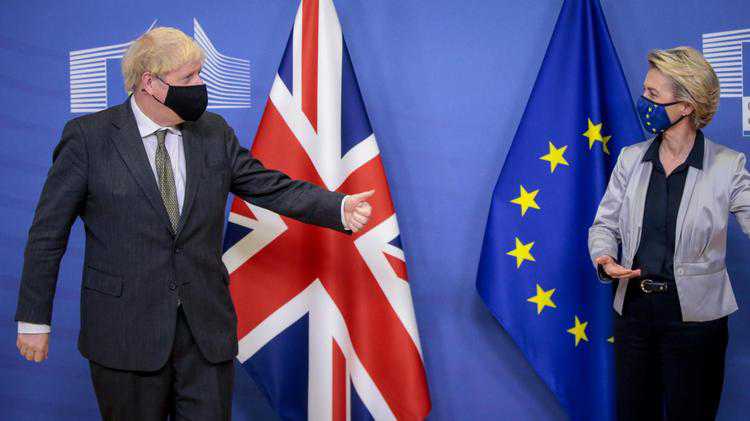UK and EU place Brexit deadline for Sunday after Johnson meal showdown with von der Leyen
10 December, 2020

British Prime Minister Boris Johnson and European Commission President Ursula von der Leyen said they might decide by Sunday whether their Brexit talks were worthwhile continuing.
After Mr Johnson arrived in Brussels on Wednesday evening for a dinner with the top of the EU, Downing Road said there have been still "large gaps" in the talks.
"The PM and VDL decided to even more discussions over another couple of days between their negotiating teams," a senior Number 10 source said.
"The PM and VDL agreed that by Sunday a company decision should be taken about the future of the talks."
Ms von der Leyen, tweeted: “We'd a good lively and interesting debate on the condition of play on spectacular issues."
“We understand each one other’s positions. They remain far apart. The clubs should promptly reconvene to try to resolve these concerns. We will come to a decision by the end of the weekend.”
The two leaders desire to inject impetus into trade talks which may have become deadlocked on key areas of the future relationship.
But Britain and the EU gave ominously opposing views of the key sticking points, and every insisted the additional must move to reach agreement.
The dinner meeting follows weeks of deadlocked negotiations between the two sides, who disagree over a level playing field, fishing rights and how any agreement will be regulated.
Mr Johnson is to sort out a list of major sticking items with Ms von der Leyen, who'll then update the 27 leaders of UN member claims on the position of a deal in the EU council conference on Thursday.
“A good deal is still there to be done,” Mr Johnson said.
But he told MPs inside your home of Commons that the EU’s demands that the UK continue steadily to stick to the bloc's benchmarks or face retaliation weren't “terms that any prime minister of the country should accept".
German Chancellor Angela Merkel said “there continues to be the opportunity of an agreement” but stressed that the EU would not compromise its core rules.
Britain kept the EU about January 31 after 47 years of membership, but remains found in the bloc’s tariff-free single market and Customs union until the end of the entire year.
Reaching a trade package by then would ensure there are no tariffs or quotas in trade in goods on January 1, though there would be new costs and limits to get businesses.
When Mr Johnson was flying over the English Channel to Brussels, underneath him the effects of Brexit were currently visible.
There were extra long lines in France’s Calais, where truckers were trying to meet the demands of UK companies that are looking to lay in extra stock before possible disruption in January 1.
Failure to secure a good trade deal would trigger much greater disruption, getting tariffs and additional barriers that could hurt both sides.
Most economists think that the British overall economy would have a greater hit because the UK does almost 50 % of its trade with the bloc.
Weeks of trade talks experience didn't bridge the gaps on the 3 issues.
While both sides want a deal, they have fundamentally different views of what it entails.
The EU fears Britain will slash social and environmental standards and pump state money into UK industries, learning to be a low-regulation monetary rival on the bloc’s doorstep.
That brought the demand for strict “level using field” guarantees in trade for access to its markets.
“The integrity of the sole market must be preserved,” Mrs Merkel said.
“We must have an even playing field not simply for today, but we must possess one for tomorrow or perhaps the day after.
"And to do this, we should have agreements how you can react if the different changes their legal scenario."
Mr Johnson’s government regards Brexit to be about sovereignty and “taking rear control” of the country’s regulations, borders and waters.
It promises the EU is building demands that it has not placed on various other non-member countries and is trying to bind the UK to its guidelines indefinitely.
“Our friends in the EU are insisting that if indeed they pass a fresh law later on with which we in this region usually do not comply or don’t follow match, then they want the automated right to punish us and retaliate,” Mr Johnson said.
He called the bloc’s demands unacceptable.
Downing Street has explained that if the two leaders can make progress at their three-course evening meal, their chief negotiators, who actually are also attending the food, could resume talks in a final deal.
Amid the gloom, one area of tension has been resolved.
The Uk government has dropped plans to break international law after reaching an agreement with the EU on rules governing trade with Northern Ireland, the only portion of the UK that shares a territory border with the bloc.
The Brexit divorce agreement struck by both sides last year promised there will be no Customs checks or various other trade barriers along Northern Ireland’s border with EU member Ireland.
The British government introduced legislation in September enabling it to breach the legally binding withdrawal agreement, to keep goods flowing to Northern Ireland in the event of a “no-deal” Brexit.
Britain claimed the costs was needed as a safety net however the move infuriated the EU, which found it just as an act of bad faith that could imperil Northern Ireland’s peace settlement.
Source: www.thenationalnews.com
